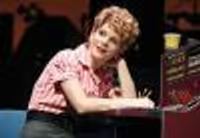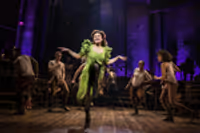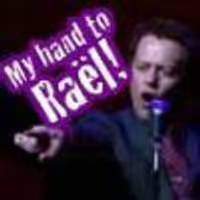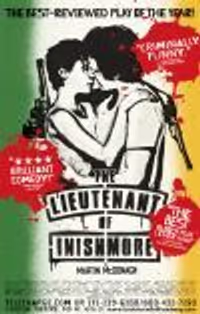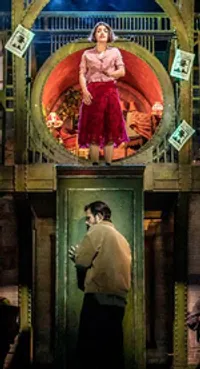So is it okay for audience members to sing along during musicals?
LxGstv
Broadway Star Joined: 11/22/16
#50So is it okay for audience members to sing along during musicals?
Posted: 5/17/19 at 12:20pm
Dave28282, on the article she mentions that while her mother was being shushed, black and latinx audience members around her giggled in amusement of the white patron and his “audacity”.
Well, I’m actually a part of the Latino demographics and I would not be giggling with them, I would be telling them to just be quiet.
The most infuriating part of the article is when she brings up Hamilton, just because you can engage with the material on a different level, doesn’t mean you can act however you like in the theater.
I think it’s worth noting again that Dominique Morisseau who wrote the book for Ain’t Too Proud actually retweeted the article in agreement, she wants the audience to participate in her shows.
edit: here’s the tweet I mentioned: https://twitter.com/domorisseau/status/1124053294811426838?s=21
#51So is it okay for audience members to sing along during musicals?
Posted: 5/17/19 at 12:40pm
LxGstvsaid: ...I think it’s worth noting again that Dominique Morisseau who wrote the book for Ain’t Too Proud actually retweeted the article in agreement, she wants the audience to participate in her shows."
I respect Ms Morrisseau and her work. When she pays me to sit in a theater, then I'll be glad to listen to every American Idol never was sing to her/his/they content.
Until that day comes, she can want all she wants. But y'all STFU when I'm spending my own money. Sing at home. Or in Times Square.
#52So is it okay for audience members to sing along during musicals?
Posted: 5/17/19 at 12:59pm
"I think it’s worth noting again that Dominique Morisseau who wrote the book for Ain’t Too Proud actually retweeted the article in agreement, she wants the audience to participate in her shows."
That sounds like a good reason to me to not buy ticket to this show. I want to be able to hear the wonderful actors in the show not the audience members. Thankfully, I can buy the recording of the show in the future.
#53So is it okay for audience members to sing along during musicals?
Posted: 5/17/19 at 2:22pm
This was talked about many, many times in several different threads how people have been singing along at every performance. That is why I was warning people beforehand, just deal with it or don't go. You will be telling half the theater to be quiet, it's a losing battle. Oh, and the Cast Recording is out now.
#54So is it okay for audience members to sing along during musicals?
Posted: 5/17/19 at 2:31pm
White gatekeeper/??seriousl
anyway the answer is No, No, No, No. I did NOT pay to hear you sing. It is rude.
of course, unless it is "no Time at All" and Andrea Martin is asking you to join in. Then you must ![]()
Phantom4ever
Broadway Legend Joined: 9/17/07
#55So is it okay for audience members to sing along during musicals?
Posted: 5/17/19 at 3:34pm
I was on the fence about seeing Ain't too Proud because of the audience singing but now that the bookwriter is condoning audience singing, I am definitely not seeing it. I would imagine that if she were trying to watch a play or musical and people would not shut up around here, she would have a problem with it but unfortunately this has become about race and not respect of the theater space.
#56So is it okay for audience members to sing along during musicals?
Posted: 5/17/19 at 3:43pm
No, it isn't. And I think trying to make this issue about race is actually laughably ridiculous.
VintageSnarker
Broadway Legend Joined: 1/30/15
#57So is it okay for audience members to sing along during musicals?
Posted: 5/17/19 at 3:49pm
LxGstv said: "I think it’s worth noting again that Dominique Morisseau who wrote the book for Ain’t Too Proud actually retweeted the article in agreement, she wants the audience to participate in her shows.
edit: here’s the tweet I mentioned:https://twitter.com/domorisseau/status/1124053294811426838?s=21"
Not surprising. Anyone else remember this? https://www.americantheatre.org/2015/12/09/why-i-almost-slapped-a-fellow-theatre-patron-and-what-that-says-about-our-theatres/
#58So is it okay for audience members to sing along during musicals?
Posted: 5/17/19 at 4:20pm
My feelings about why singing along and audibly engaging with theater is how distracting it can be for audience members, even if you don't think it is. My sister has near total hearing loss in one ear (only recently diagnosed as an adult - she compensated for over 30 years), and while she doesn't need assisted listening devices, she DOES have to work a lot harder to listen and follow live theater. If someone next to her was singing or otherwise drawing her aural focus from the show, she can't engage in the show anymore.
#59So is it okay for audience members to sing along during musicals?
Posted: 5/17/19 at 5:11pm
theatregeek6 said: "White gatekeeper/??seriousl
anyway the answer is No, No, No, No. I did NOT pay to hear you sing. It is rude.
"
I know right? That comment is really disgusting. I can't believe moderators don't delete it while they delete everything else.
#60So is it okay for audience members to sing along during musicals?
Posted: 5/17/19 at 5:12pm
I think there isn't one correct way to engage with live theatre as an audience member, that the predominant way on Broadway is one built on the historic behavior of a specific group that may not be representative of audiences today, and that as of now there is not a great way to reconcile differing cultural baggage in a diverse audience.
But at the end of the day, this is not a "sit quietly, it's serious theatre" show. People sing at Beautiful, Jersey Boys, Mamma Mia, etc.
#61So is it okay for audience members to sing along during musicals?
Posted: 5/17/19 at 5:18pm
Kad said: "I that as of now there is not a great way to reconcile differing cultural baggage in a diverse audience."
I think this has nothing to do with cultural baggage or race or a diverse audience. It's about respect.
Dollypop
Broadway Legend Joined: 5/15/03
#62So is it okay for audience members to sing along during musicals?
Posted: 5/17/19 at 5:38pmI defy anyone from trying to stop me from singing along during HELLO, DOLLY!
#63So is it okay for audience members to sing along during musicals?
Posted: 5/17/19 at 5:47pm
The article is about race, so it's being talked about. It should not be about race, but the article is all about it (insulting white people's balding heads for no reason) so sadly, it will be talked about within this discussion.
#64So is it okay for audience members to sing along during musicals?
Posted: 5/17/19 at 5:50pmDo people not realize The Root is a black-focused blog? Yes, race is a factor in this.
#65So is it okay for audience members to sing along during musicals?
Posted: 5/17/19 at 5:50pm
Dollypop said: "I defy anyone from trying to stop me from singing along during HELLO, DOLLY!"
Should be fairly easy with the show closed and all?
#66So is it okay for audience members to sing along during musicals?
Posted: 5/17/19 at 6:11pm
Kad said: "I think there isn't one correct way to engage with live theatre as an audience member, that the predominant way on Broadway is one built on the historic behavior of a specific group that may not be representative of audiences today, and that as of now there is not a great way to reconcile differing cultural baggage in a diverse audience.
I've re-read this 4 times and still have no idea what you said.
and DP I would certainly tell you to STFU. It's not your show or your theatre. You are just a member of the audience no matter how well you know the show---do your singalong at home.
#67So is it okay for audience members to sing along during musicals?
Posted: 5/17/19 at 7:24pm
Dollypop said: "I defy anyone from trying to stop me from singing along during HELLO, DOLLY!"
Welcome back, Dollypop. You’re positive energy and passion has been missed very much!!! ![]()
#68So is it okay for audience members to sing along during musicals?
Posted: 5/17/19 at 7:30pm
SO nice to have you back where you belong
#69So is it okay for audience members to sing along during musicals?
Posted: 5/17/19 at 8:10pm
Dave28282 said: "Kad said: "I that as of now there is not a great way to reconcile differing cultural baggage in a diverse audience."
I think this has nothing to do with cultural baggage or race or a diverse audience. It's about respect.
"
Well, you're just wrong and lack education in theater history.
Yes, sitting in silence (except for conventions such as applause after numbers, something posters here ALSO bitch about, BTW) is the convention since Wagner in European theaters. So that's about 200 years.
On the other hand, vocal audience participation in African and African-American performance (including, most importantly, churches) goes back THOUSANDS of years. In classic African theater, the audience is an acknowledged performer in the play and takes part in the telling of the story. In that tradition, sitting silently is considered disrespectful, a refusal to engage with the performance or worship. (This is not true of all African-American theaters or churches, of course. But the "call-and-response" convention persists even into the 21st century.)
I find uninvited audience singalongs as annoying as anyone here, but let's don't pretend that the way "WE" do it is the way everyone in the world does it.
Now why old people sing along escapes me. I'm 65 and my husband is, uh, somewhat older. We saw FALSETTOS week before last and though we both know every word and every note, neither of us was tempted to sing along. Different cultural background.
I'm not sure what the answer is; as others have implied, it may depend on the style of the production. The original DREAMGIRLS was pretty much ruined for me because the audience was screaming and applauding every time and all the time Holliday was singing. I'd never encountered that before and didn't understand it. I'd like to think I'd cope better today.
#70So is it okay for audience members to sing along during musicals?
Posted: 5/18/19 at 12:59am
GavestonPS----Same for me when I saw Dreamgirls in San Fran and I nearly shxt myself when all that screaming and 'go girl' started. I have no recollection of the show except the audience.
and for all those Dollypop supporters it's his/her actions in a theatre space that I am criticising. Look at me?
VintageSnarker
Broadway Legend Joined: 1/30/15
#71So is it okay for audience members to sing along during musicals?
Posted: 5/18/19 at 1:20am
GavestonPS said: "Well, you're just wrong and lack education in theater history.
Yes, sitting in silence (except for conventions such as applause after numbers, something posters here ALSO bitch about, BTW) is the convention since Wagner in European theaters. So that's about 200 years.
On the other hand, vocal audience participation inAfrican and African-American performance (including, most importantly, churches) goes back THOUSANDS of years. In classic African theater, the audience is an acknowledged performer in the play and takes part in the telling of the story. In that tradition, sitting silently is considered disrespectful, a refusal to engage with the performance or worship. (This is not true of all African-American theaters or churches, of course. But the "call-and-response" convention persists even into the 21st century.)
I find uninvited audience singalongs as annoying as anyone here, but let's don't pretend that the way "WE" do it is the way everyone in the world does it."
There's more to the audience demographic breakdown than black and white. There are many cultural traditions of theater and storytelling. And if we're really talking about inclusion and intersectionality what about those with anxiety, autism, etc.? I know there are sometimes ADA performances but you never know what someone's going through. Ultimately theater is a shared space. It's important to find some kind of balance where everyone feels welcome and comfortable. (And no, I don't mean you shouldn't be challenged by anything on stage but there should be a baseline for conduct that benefits the majority of the audience.)
#72So is it okay for audience members to sing along during musicals?
Posted: 5/18/19 at 4:57pm
This idea would have unfortunate racial overtones in many places, but in a different world, I wonder if it would work to have dedicated 'quiet' and 'participation' theatre seating sections, a bit like dedicated quiet train carriages. Hear me out :) For many music concerts, in my admittedly limited experience, there is a dedicated ticket type and venue area for the mosh pit as compared to the seated area. Mosh pit patrons get prime position closest to the stage, while the seated patrons (probably older on average) get a little more comfort and quiet, with seating located higher than the mosh pit to prevent those on their feet from blocking others' sightlines. The conventions of each section are clear, and I don't think there's any particular sense of suspicion or animosity between the two; it's just catering to patrons' differing preferences in a way to minimise inconvenience to all. (I'm not suggesting literal mosh pits within theatres, BTW.) Obviously in a theatre, sound would carry between sections more easily, but perhaps the best/worst of having patrons with different preferences in close proximity would be minimised. But yeah... doing this would probably 'read' as being a form of segregation by another name, unfortunately.
(Personally, I haven't experienced being seated close to vocal patrons in a theatre setting, so I'm not 100% sure how I would respond.)
#73So is it okay for audience members to sing along during musicals?
Posted: 5/18/19 at 9:22pm
Dollypop said: "I defy anyone from trying to stop me from singing along during HELLO, DOLLY!"
Are you serious, Dolly? I would think you'd have more respect for the play.
#74So is it okay for audience members to sing along during musicals?
Posted: 5/18/19 at 9:37pm
VintageSnarker said: "There's more to the audience demographic breakdown than black and white. There are many cultural traditions of theater and storytelling.And if we're really talking about inclusion and intersectionality what about those with anxiety, autism, etc.? I know there are sometimes ADA performances but you never know what someone's going through. Ultimately theater is a shared space. It's important to find some kind of balance where everyone feels welcome and comfortable. (And no, I don't mean you shouldn't be challenged by anything on stage but there should be a baseline for conduct that benefits the majority of the audience.)
"
Of course, there are more theater traditions than just the African and the European (and neither of those traditions are entirely uniform). I was just providing one--often remarked upon--example. If you want my entire course on THE HISTORY OF WORLD THEATER, we'll need at least nine months and probably a different message board.
I have no objection if theaters want to try--with signs, recorded announcements, a curtain speech, whatever--to communicate the desired behavior to the audience. I want more plays like ANGELS IN AMERICA, which can accommodate some vocal responses from the audience, but which are basically written with the idea that the audience will hear every line. However, we should keep in mind that audiences once shouted back at HAMLET, while the bear and the dogs were waiting off-stage to fight between acts. (Some historians question whether bear-baiting every actually took place during Shakespeare's plays, but variety acts of various kinds were part of the event.)
My point is not that it's racist to want a quiet audience, but that it's ignorant to assume everyone comes from the same performance tradition.
Videos


